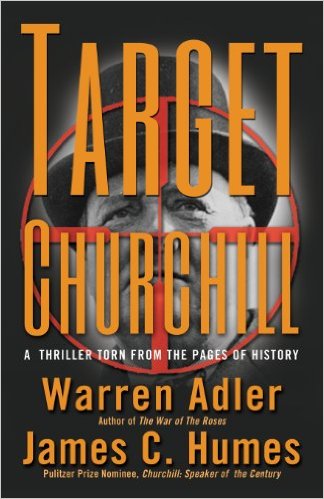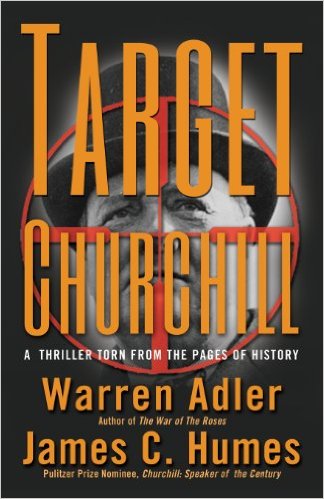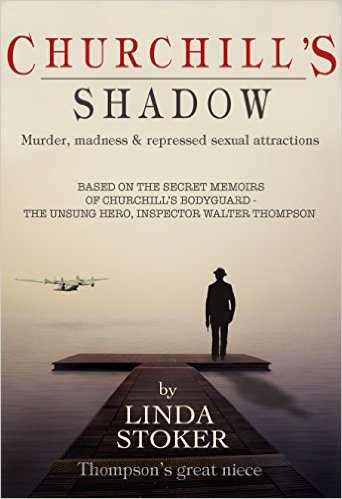
Finest Hour 173
Books, Arts, & Curiosities – Churchill as a Literary Character: WSC in Fiction

August 14, 2016
Finest Hour 173, Summer 2016
Page 44
Linda Stoker, Churchill’s Shadow, Beswick and Beswick, 2015, 1114 KB, $7.57. ASIN: B0150XHGRG Portrayal of Churchill * Worth Reading **
Warren Adler and James C. Humes, Target Churchill, Stonehouse Press, 2013, 318 pages, $15.95. ISBN: 978–1590061183 Portrayal of Churchill ** Worth Reading **
Review by Michael McMenamin

2025 International Churchill Conference
Michael McMenamin and his son Patrick are co-authors of the award-winning Winston Churchill Thriller series The DeValera Deception, The Parsifal Pursuit, The Gemini Agenda, and The Berghof Betrayal set during Churchill’s Wilderness Years, 1929–39.
 Novels are rated one to three stars on two questions: Is the portrayal of Churchill accurate, and is the book worth reading?
Novels are rated one to three stars on two questions: Is the portrayal of Churchill accurate, and is the book worth reading?
These are two very similar books, and I wanted to like them a lot more than I did. Both involve plots to assassinate Churchill. Churchill’s Shadow has Heinrich Himmler tasking Walter Schellenberg in July 1939 to assassinate Churchill when he visits the Duke of Windsor at his home on the French Riveria. Target Churchill has NKVD chief Lavrentiy Beria ordering the killing of Churchill in 1946, when he gives his famous Sinews of Peace speech at Westminster College in Fulton, Missouri.
Linda Stoker is the great niece of Churchill’s bodyguard Walter Thompson, and the cover states that it is based on Thompson’s “secret memoirs.” Warren Adler, a long time mystery and thriller writer, is best known for his novel The War of the Roses, while James Humes has written several non-fiction books on Churchill.
The problem I had with both books was that I just could not buy into their underlying premise— and that is critical to any historical novel. The reader has to believe that the story could have happened, even though he knows it did not. It is called verisimilitude, the willing suspension of disbelief. And this reader does not believe that Hitler and Himmler, two months from invading Poland, would order the assassination of an out-of-power Churchill or that Himmler would say, “We cannot afford to miss this excellent opportunity to eliminate Herr Churchill before he causes us any more damage [emphasis added].” Similarly, I do not believe that Stalin and Beria would order an out-of-power Churchill killed simply because Stalin was “worried that Churchill will spread his lies and make us out to be devils” in his speech at Westminster College.
I am not going to tell you why I believe these two premises to be unrealistic. If you think them plausible, then you may well enjoy both books, which is why I gave them two out of a possible three “Worth Reading” stars.
 Of the two books, the portrayal of Churchill in Target Churchill is much better than in Churchill’s Shadow, where the dialogue does not ring true. When a Secret Service agent tells Churchill that he has it “on the best authority” that “German agents will be waiting for you” at the Duke of Windsor’s villa and that “I advise you to return to England immediately,” Churchill does not ask any questions. Rather, he tells the agent “I will follow your advice with all haste.” Really? End his holiday just like that? Why not just avoid the Duke’s villa? Or at least ask the agent for the identity of this “best authority” and why the agent believes him?
Of the two books, the portrayal of Churchill in Target Churchill is much better than in Churchill’s Shadow, where the dialogue does not ring true. When a Secret Service agent tells Churchill that he has it “on the best authority” that “German agents will be waiting for you” at the Duke of Windsor’s villa and that “I advise you to return to England immediately,” Churchill does not ask any questions. Rather, he tells the agent “I will follow your advice with all haste.” Really? End his holiday just like that? Why not just avoid the Duke’s villa? Or at least ask the agent for the identity of this “best authority” and why the agent believes him?
In truth, Stoker’s Churchill would deserve two stars for her portrayal and the Adler and Humes Churchill three stars, but for one thing. They both gratuitously and inaccurately refer to Churchill’s “Black Dog.” For example, Stoker’s Churchill stops dictating for a “long 30 minutes,” and she writes that his secretary “had become familiar with his black dog depression days but this was different—worse [emphasis in original].” Really? Thirty minutes of silence is a symptom of depression? And speaking of worse, Adler and Humes write that Churchill “called these fits of melancholy his ‘black dog’—oppressive, deep depression that filled him with ennui and self-loathing.” Seriously? Black Dog meant Churchill was filled… with…self-loathing? Churchill, the man who thought himself a “glow worm”?
Mary Soames said on more than one occasion that she believed that some Churchill biographers made “rather too big a meal” of her father’s casual use of a term Victorian nannies used to describe their charges’ bad moods. Well, you can add novelists to that list as well, and that is why I docked them one star each for their Churchill portrayal. For the record, Churchill never suffered from clinical depression at any point in his life. Ever. Full stop. See “The Myth of the Black Dog” in Finest Hour 155, Summer 2012.
Subscribe
WANT MORE?
Get the Churchill Bulletin delivered to your inbox once a month.



